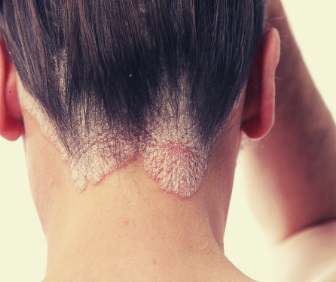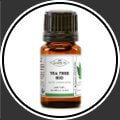Eczema, also called “dermatitis”, is the most common skin disease in France. It is also the cause of 30% of dermatology consultations. Defined as an inflammation of skin tissue, eczema manifests itself as redness, swelling and itching on skin that usually flakes or oozes. It develops in sudden outbreaks and most often appears in childhood, preferably in children predisposed to allergies. Eczema is not contagious, therefore it is not transmitted from one person to another, but the number of people affected has tripled in thirty years in parallel with the explosion of allergies.
In this article you will find general information about eczema to understand its causes and symptoms, as well as to differentiate between the various types of eczema that exist. The essential oils and vegetable oils most recognized for treating eczema will be presented and accompanied by some health tips to improve your daily life and help you prevent eczema attacks.


Local treatment based on essential oils to treat eczema flare-ups
Why we like it: This synergy of essential oils is very effective in calming the discomfort linked to eczematous outbreaks. Soothing, anti-inflammatory and healing, it reduces itching, repairs tissues and calms redness.
Ingredients :
- 20 drops ofItalian helichrysum essential oil
- 20 drops ofgerman chamomile essential oil
- 15 drops ofaspic lavender essential oil
- 4 ml d'borage vegetable oil
Preparation: Mix the ingredients in a 5ml amber dropper bottle. Shake it to homogenize the preparation well.
How to use it :
Apply a few drops of the synergy to eczema patches then massage gently. Repeat 2 to 3 times a day for up to 5 days.Precaution: Never use this mixture in pregnant or breastfeeding women and children under 8 years old. Respect the indicated dosages and do not use orally.

Soothing and comforting massage against stress linked to eczema
Why we love it: This massage soothes eczematous inflammation, brings comfort and improves morale during an eczema flare-up. To be used all over the body, this synergy is intended to be calming for the skin and the mind, thus bringing you harmony and well-being during a crisis.
Ingredients :
- 5 drops oflemon eucalyptus essential oil
- 10 drops oflemon listed essential oil
- 20 drops oftrue lavender essential oil
- 48 ml d'apricot kernel vegetable oil
Preparation: Mix the ingredients in a 50 ml amber bottle. Shake to homogenize the preparation well.
How to use it :
Massage 5 to 10 drops of the synergy onto the body (back, arms, legs, etc.) in the evening before bed. To be used reasonably when the desire for a massage arises.Precaution: Never use in pregnant or breastfeeding women and children under 8 years old. Respect the indicated dosages and do not use orally.

Synergy of essential oils to calm itching due to eczema
Why we love it: This synergy of essential oils is extremely effective in calming itching during eczematous attacks and flare-ups.
Ingredients :
- 5 drops ofpeppermint essential oil
- 10 drops ofnoble chamomile essential oil
- 20 drops oftrue lavender essential oil
- 8 ml of calendula macerate
Preparation: Mix the ingredients in a small 10 ml amber dropper bottle. Shake to homogenize the preparation well.
How to use it :
Apply a few drops of the proposed synergy to the area of pruritus (itching sensation) then massage. Repeat 2 to 3 times daily for 3 to 5 days.Caution: Do not use over large areas. Peppermint essential oil could cause a generalized “chill” effect. Do not dilute this mixture in a bath. Never use during pregnancy and breastfeeding. Not recommended for people with epilepsy, asthma, the elderly or hypertensive people and children under 12 years old. Respect the indicated dosages and do not use orally.

Nourishing anti-squamation butter for eczema
Why we love it: Nourishing and regenerating, this butter can be used daily to nourish and help repair the skin. The presence of urea makes it ideal for fighting scales and deeply hydrating the skin.
Ingredients :
- 4 g d'urea
- 10 ml d'argan vegetable oil
- 30 grammes Shea Butter
Preparation: Melt the shea butter in a bain-marie. Meanwhile, grind the urea to a fine powder in a mortar. Then dilute it in a very small amount of water, just enough to dissolve it. When the shea butter is almost melted, add the argan oil and mix. Then remove the mixture from the heat and add the urea to it. Transfer everything to a 50 ml jar then mix until the butter solidifies.
How to use it :
Massage daily with a hazelnut of this mixture the areas affected by dryness and eczema.Precaution: Do not use in pregnant or breastfeeding women and children under 8 years old.
Contraindications:
Essential oils are generally not recommended for pregnant women (during the entire pregnancy), breastfeeding women and children under 8 years old (12 years old for certain essential oils). Carefully read the contraindications for each essential oil.
These properties and methods of use do not constitute medical advice. For therapeutic use consult a doctor.

What are the symptoms of eczema?
Eczema often manifests itself by:
- Redness accompanied by swelling;
- Itching with, in some cases, the appearance of sores linked to scratching. These sores can be problematic when infected by fungus or bacteria;
- Very dry skin where scales may appear;
- Vesicular outbreaks (small pimples filled with transparent fluid);
- Quality of sleep impaired by itching.

Fine lavender essential oil (Lavandula angustifolia): No. 1 against eczema
Properties: This is undoubtedly the most famous and most used of all essential oils! It acts effectively against many skin problems: wounds, cuts, pimples, acne, eczema, pruritus, psoriasis, burns... Antiseptic, regenerating and exceptional healing, it disinfects and promotes the healing of tissues. Unparalleled soothing, it helps with itching. Its effectiveness and great skin tolerance make true (fine) lavender an essential essential oil in the family aromatic pharmacy.
Uses: Fine lavender essential oil can, for example, be used in the bath: to do this, simply dilute 15 drops of fine lavender essential oil in 1 teaspoon of Epsom salts. Then pour the mixture into the bath water for a relaxing, healing and soothing action. Fine lavender essential oil can also be diluted in a vegetable oil then applied topically to the skin.
Precautions: Not recommended for pregnant and breastfeeding women and children under 8 years old.

Rosewood essential oil to treat eczema (Aniba rosaeodora)
Properties: Nicknamed “the essential oil of the skin”, rosewood is universal. Regardless of the user's skin type, rosewood is very effective in treating many skin conditions. As such, it has powerful regenerating, healing and softening properties. Thus, it acts on acne, skin fungus, skin irritations, eczema, itching, diaper rash, wrinkles, stretch marks... It is ideal for cleaning up infected eczema or for healing lesions due to itching.
Uses: To nourish and heal the skin: dilute 1 drop of rosewood essential oil in your dose of body cream or milk and apply it morning and evening.
Precautions: Be careful, this essential oil is prohibited during pregnancy and breastfeeding. Avoid in children under 8 years of age, unless otherwise advised by a healthcare professional.

Roman chamomile essential oil to calm and heal eczema (Chamaemelum nobile)
Properties: Anti-inflammatory, antipruritic, antiallergic and painkiller, it is the number 1 essential oil for hypersensitive skin. Indeed, it calms pain linked to irritation, itching and more generally inflammation such as eczema. It also has healing properties, helps reduce nervousness, promotes relaxation and thus facilitates sleep.
Its effects on the body and mind are very appreciated in cases of low morale linked to eczema.
Uses: For itching, whatever the cause, mix 2 drops of Roman chamomile essential oil with 10 drops of carrier oil. Then massage the affected areas with the mixture 3 times a day for 5 to 7 days.
Precautions: Not recommended for pregnant and breastfeeding women and children under 8 years old.

Peppermint essential oil for itching due to eczema (Mentha piperita)
Properties: Powerful painkiller and antipruritic, peppermint essential oil is a panacea for itching. The “cold” effect it provides is ideal for soothing and calming itching. This very powerful essential oil will always be used with caution by an informed public or accompanied by an aromatherapist or health professional.
Uses: To combat itching, dilute 3 drops of peppermint essential oil in a tablespoon of vegetable oil then massage the affected areas with this mixture morning and evening for a maximum of 3 days. Do not apply over large areas.
Precautions: Be careful, this essential oil should never be used in a bath. Always dilute in a vegetable oil before applying to the skin. To be applied only to limited areas. This very powerful essential oil will always be used with caution by an informed public or accompanied by an aromatherapist. Do not use in children under 12 years of age, pregnant and breastfeeding women, the elderly, epileptics and hypertensive people.

Lemon eucalyptus essential oil to calm the inflammation of eczema (Eucalyptus citriodora)
Properties: Lemon eucalyptus essential oil: the anti-inflammatory par excellence! Ideal for treating inflammation linked to eczema, it helps reduce the characteristic redness and swelling. Powerful percutaneous analgesic, it is used exclusively on the skin to soothe and calm itching.
Uses: Dilute 5 drops of lemon eucalyptus essential oil in a teaspoon of vegetable oil then massage the red and swollen areas with this mixture 3 times a day.
Precautions: Please note that this essential oil should never be used during pregnancy and breastfeeding. It is also not recommended for children under 8 years old. Do not ingest. Always dilute this essential oil in a vegetable oil, never apply pure to the skin.

Calendula macerate (Calendula officinalis):
Properties: Soothing and well tolerated, calendula macerate is an effective ally for the care of babies and sensitive skin in general. It has powerful anti-inflammatory, healing and antipruritic properties. Very effective in cases of eczema, skin allergies and hives, it calms redness, itching and irritation, nourishes and soothes dry, fragile and sensitive skin (baby, children). Calendula macerate is used exclusively through the skin.

Borage oil (Borago officinalis):
Properties: Rich in gamma-linolenic acid, it is the ideal oil for dry, mature and suffering skin (irritation, eczema, psoriasis, etc.). Regenerating, repairing and softening, it restores elasticity and tone to the skin. Borage oil is also used to prevent the formation of wrinkles and is of great interest in combating stretch marks. Absorbed orally or applied to the skin, this oil helps moisturize, nourish tissues and effectively fight against skin dryness.

Evening primrose oil (Oenothera biennis):
Properties: Evening primrose oil is known to act actively against chronic skin inflammations, particularly important in cases of eczema. It promotes skin regeneration, soothes itching and irritation. An antioxidant, evening primrose oil protects the skin from free radicals and facilitates cell renewal. This is therefore particularly useful in treating scratching lesions, scabs and scars caused by eczema. Please note, this oil is fragile and it is recommended to consume it within 3 months after opening.

Aloe vera:
Properties: Aloe vera is an excellent moisturizing and nourishing treatment. Versatile, aloe vera juice has anti-inflammatory, soothing, restorative and skin healing properties. It is one of the great classics for dry and irritated skin. Aloe vera is particularly indicated in cases of eczema to soothe and repair the skin. It can also be used in case of sunburn or simply after hair removal. Adding xanthan gum (0.5%) to your aloe vera juice will turn the liquid into a gel and make it easier to apply.

Urea:
Properties: Urea, used in many dermocosmetic treatments, is recognized for its moisturizing and keratolytic properties. In low concentration (1-3%), it promotes hydration of the upper layers of the epidermis. At higher dosages (5-10%), urea helps reduce scales and makes the skin supple and soft. Finally, at high dosages, it will be used as an exfoliant for corns, calluses and other areas of dead and hardened skin. It is the essential active ingredient in moisturizing creams, particularly for dry, irritated and chapped hands.

External dermatitis:
the origin is “external” to the subject who is not genetically predisposed. The two most common external dermatitis are contact eczema and allergic eczema.
- Contact eczema: irritation that appears when the skin is brought into contact with an irritating agent such as soap, detergent or a caustic product. This reaction is normal to a dermocaustic agent.
- Allergic eczema: inflammatory reaction following contact with an object or product that is not normally irritating: jewelry, cream, animal hair, dust, etc. This product causes subjects predisposed to an “abnormal” and disproportionate reaction: this is contact allergy. It is common to be in contact with an allergen for many years before suddenly developing an allergic reaction.

Internal dermatitis:
the origin is most often genetic.
- Atopic eczema: this is certainly one of the best-known eczemas! Characterized by skin inflammation as well as redness, scales and itching, this very common condition affects 10 to 20% of children.
- Seborrheic eczema: characterized by oily, scaly and red spots, seborrheic dermatitis affects the scalp, eyebrows, nose or ears. In adulthood, the most common problem encountered will be an oily scalp accompanied by dandruff.
- Varicose eczema: often located on the lower part of the legs, it develops in conjunction with blood circulation problems in the lower limbs. It is frequently accompanied by venous stasis and varicose veins.
- Nummular eczema: red, rough skin irritations shaped like a coin.

Tips to improve your daily life:
- Favor the use of “superfatted” and natural cleaning products without perfumes or dyes.
- Avoid prolonged baths: 5 to 10 minutes maximum.
- Wash with lukewarm water and avoid scalding water.
- Rinse if you sweat profusely or if swimming in salty or chlorinated water. Salt and chlorine deposits attack the skin.
- Choose cotton clothing over synthetic materials, which may irritate the skin.
- Avoid exposure to tobacco as much as possible.
- Reduce sources of stress.
- Avoid exposure to allergenic substances (animal hair, mites, dust, food allergens, etc.)
- Ventilate living rooms regularly and use air humidifiers. An atmosphere that is too dry causes dehydration of the skin and therefore an increased risk of itching.
- In case of itching, do not scratch and directly apply a moisturizing cream or a cold water compress.
Bibliography
- Pierre M, Gayet C My bible of herbalist secrets. Ed. Leduc. S 2016
- Baudoux D and Breda ML Chemotyped essential oils. Scientific aromatherapy. Ed. JOM 2015
- Baudoux D Practical guide to family and scientific aromatherapy. My 12 favorite essential oils in 100 very effective formulas for 300 diseases. Ed JOM 2014
- Baudoux D, J. Kaibeck and AF. Malotaux. Vegetal oils. Source of health beauty pearls. More than 50 practical recipes. Ed JOM 2015
- Festy D My illustrated primer on essential oils. Ed. Leduc.s 2015
- Lefief A The complete guide to essential oils. Ed. ESI 2017
NOTE: This article was written by a pharmacist. The data summarized there come from the scientific literature and the references cited above. For medical advice, in the event of specific or prolonged symptoms, please consult your doctor. Only he will be able to make a precise diagnosis and, if necessary, provide you with the most appropriate treatment.
 OUR
OUR